Our latest research focusses on how WordPress users select plugins.

WordPress is the most popular CMS on the web, with 25% of the Alexa Top 10 million sites using it.
Although there are a lot of people and companies using WordPress, there is not a lot known about WordPress user behavior. The focus is often on site visitor behavior and analytics like where visitors are clicking or how long they stay on the site. This is important, of course, but ignores a whole other part of the equation.
What about the people doing the work on the back-end of the site? The ones investing countless hours to make sure it looks good and functions well?
April 2025 Offer – For a Limited Time Only:
Get WordPress 99+ Plugins Mega Bundle for 15% off! Don’t miss out!
At CreativeMinds, we spend a decent amount of time thinking about how people make important decisions concerning their sites. We wanted to see what the current plugin landscape looks like, straight from WordPress users.
People have a ridiculously high number of plugins to choose from when developing or managing a site. On WordPress.org alone, there are over 40,000 free plugins. WordPress users, whether they are aware of it or not, have a method to sifting through the plugin madness.
What do users want in the plugins they use? Who is the average WordPress user? What is the process people use to pick plugins?
These are all questions that can help developers design better products that users will love. It can also inform users of how other people do what they do.
The Survey

We started with a list of questions and a desire to reach out to the WordPress community for answers. With the help of Free Online Surveys, we produced a survey and asked WordPress users on channels like Quora, LinkedIn, Reddit, Facebook, and Twitter to answer.
In all, 100 people took the survey. These are real WordPress users with important opinions.
While some of the responses mirrored what we believe to be important when choosing a plugin, other questions didn’t have such clear-cut answers.
This shows choosing a plugin isn’t black and white. There is no one good way to pick a plugin, but there are aspects most users find important that influence their decisions.
Research Demographics
Before we delve into the lessons learned, here are some demographics to understand the people answering the survey.
The average age range of responders is between 26 and 35 years, with the next highest being 36-50. This means the average WordPress user is relatively young, but not too young, as very few were in their early twenties.

Most responders (42%) live in the United States, with the second highest being European countries (33%). The rest represented a vast number of countries, from Jamaica to South Africa.
The vast majority (80%) of users who responded to the survey are WordPress developers with smaller amounts of website owners, business owners, bloggers, and website managers.
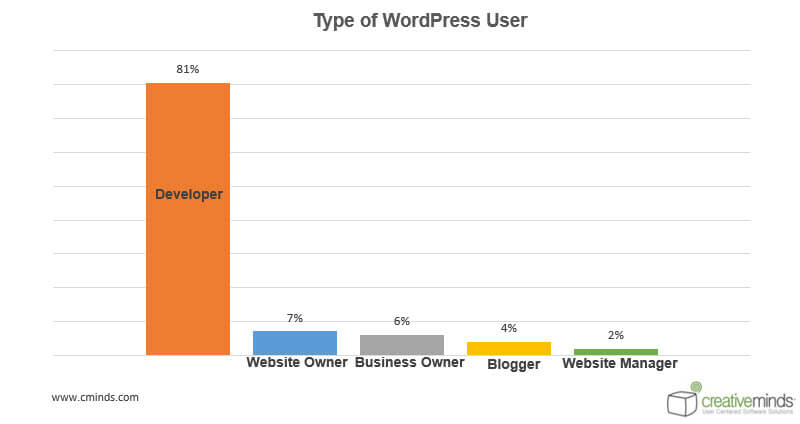
Free vs. Premium
The free vs. premium debate is a huge question. We know both free and premium plugins are popular and that both have their pros and cons.
People want to be paid for the hard work put into producing something others enjoy. Plugin developers are no exception to this. They cannot support themselves from free plugins, so will often encourage users to pay for a premium version.
Of course, free is a better price than paid, so many people opt for free plugins.
In what ratio do people choose one over the other?
Our survey shows people most often choose free plugins. The majority of people (56%) most often choose free plugins with a few premium plugins. 34% choose premium and free plugins equally.
Very few people (6% of respondents) choose only free plugins and even less mostly go premium.
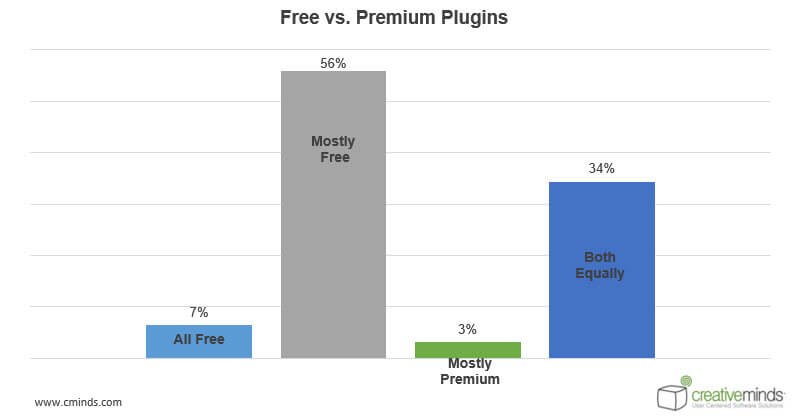
This shows the majority of WordPress users recognize the benefits of premium plugins, but if a premium plugin is going to be chosen over a free one, it needs to be special.
This leads to the next question. Why do users choose premium plugins over free ones? We asked respondents to choose from popular reasons to use premium plugins.
The answer? It comes down to features. This is the deciding factor and the most important characteristics of a plugin.
Users look for a plugin because they have a need. So, if there is a free plugin with the desired features, users are less likely to go with the premium version that has the exact same features.
The key to getting people to buy premium plugins? Offer premium plugins that are unique and fill a void. If a premium plugin is the only option to get a certain feature, users who want that feature will have to pay.
One-third of users value extra features they get from switching to the premium version of a plugin. Designing which features should be in each version can be a delicate task.
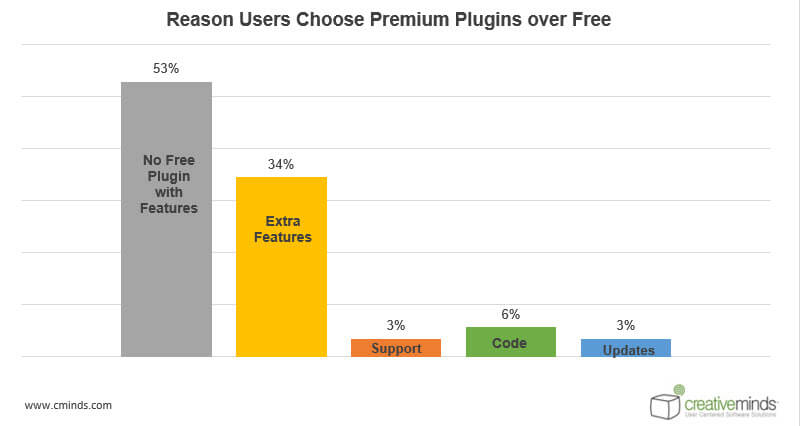
What are people willing to pay for a plugin?
With our answer to the free versus premium debate, we know users are purchasing a select number of premium plugins over free plugins, most often for the features. We know people are buying premium plugins, but what exactly are people paying for them?
This is an important question, as there are people who believe plugin prices are too low for the time saved and productivity gained they offer.
It turns out, people are willing to spend decent money on a good plugin. 49% of respondents said they will pay over $60 for a good plugin. This shows the idea that people aren’t willing to pay more for a good plugin is a false one.

What is a good plugin?
As the graph below shows, most WordPress users aren’t using a ton of plugins on each site. With the overwhelming majority of people using less than 30 plugins, WordPress users must choose wisely. If you have less open room to spare, you have to be pickier about how you fill the space.

We know people are willing to spend money on good, premium plugins and that they are selective about how many plugins they’re using. What we haven’t discussed yet is what users think makes a good plugin.
What is a good plugin? What determines whether a plugin makes the cut? The answers to this question centered around three piece: security, ease of use, and support. These are what tend to make good plugins good, not necessarily the name of a well-known developer.

In a way, this question slightly discounted the question about choosing premium plugins over free. Cool features only makes up 12% of the responses. This shows having a plugin with great features isn’t everything. It needs to be the total package. An unsafe plugin with bad support isn’t great, no matter how many exciting features it may offer.
Interestingly, respondents also wrote in answers emphasizing the importance of a well-coded and compatible plugin.
Where to Find Plugins
Another question we wanted an answer to is “where do users go to find plugins?”
WordPress users tend to use Google or WordPress.org to find a plugin. They are less likely to use resources like CodeCanyon or go to a specific developer’s site to find a new plugin.
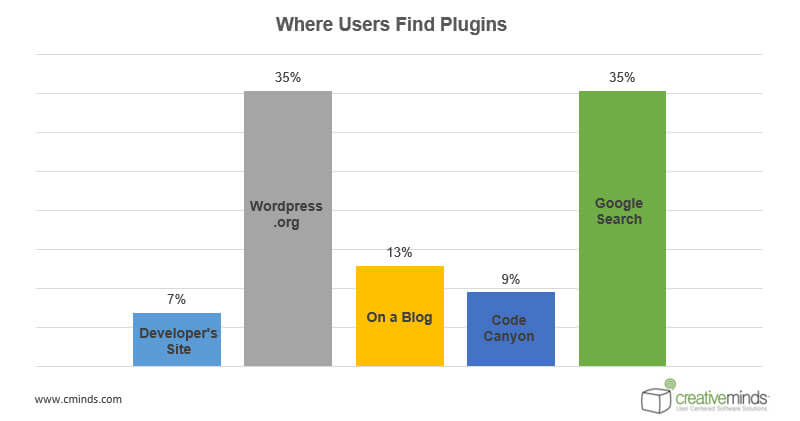
This shows if developers want to reach more people, they should focus their presence on these sites. Developers can take steps to make their WordPress.org page better by providing more updates, support, and generally making their plugin better. This will improve ratings and downloads. They can also use SEO to make their plugin easier to find through Google.
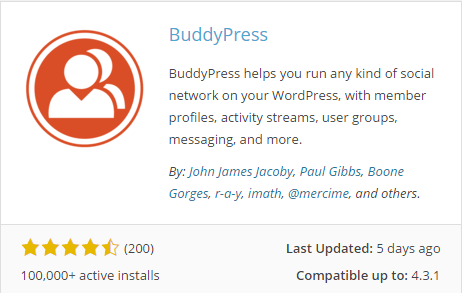
The appearance of a popular plugin on WordPress.org
Deciding Between Two Plugins
When you’re looking for a new plugin, it can be common to narrow your search to a few similar plugins. In this situation, how do you decide which plugin to choose?
Well, what do other people do?
Our research shows that when a WordPress user is confronted with two similar plugins, they tend to pick a plugin based on how frequently it is updated. In a close second is the plugin developer’s reputation. Support is also an important contender in the decision.
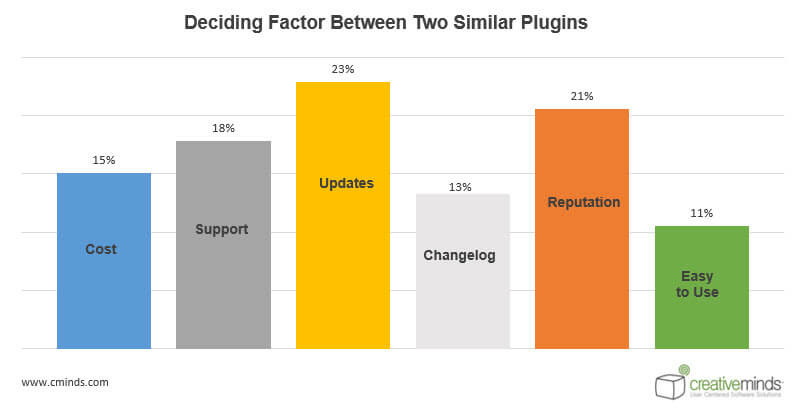
These are what set a plugin apart from the others. Interestingly, users tend not to use how many issues are addressed in the changelog to make a decision, even though they look at how recently a plugin was updated.
What does good plugin support look like?

Good plugin support comes in handy, especially when there is a problem. It can determine whether a problem is resolved or users search for another plugin. If a plugin has a lot of ins and outs, support is an extremely important addition to the learning curve.
Premium plugins tend to have more reliable support. This is one of the reasons for choosing a premium plugin. That doesn’t mean users don’t value support in all plugins.
When examining a possible plugin to add to their cadre, users often consider support. How do they evaluate support? What does good support look like to a user who has not yet used a certain plugin?
The majority of WordPress users evaluate plugin support by reading what other users think about it. One way to do this is through reviews on WordPress.org from users who have experience with the plugin’s support.
Significantly less users (15%) test a plugin’s support by sending an email to the plugin developer and noting their response time and accuracy. This can be a more thorough, albeit more involved, measurement of support.

If other users say the support is good, WordPress users tend to take their word. In this response, the open-source nature of WordPress is evident. Users generally trust the opinions of other users. As long as users are being truthful, this can be an accurate picture of support.

Reviews on WordPress.org addressing support
Developers must build a reputation among users of offering good support. If you’re a plugin developer, it is worth considering how users evaluate your support.
What are they saying in reviews? Are you responding to users in the WordPress.org support forum? Do your answers fix the issue they are experiencing? If you find something is lacking, here are some tips for improving plugin support.
For more discussion of WordPress support, check out our article “Where to Find Good WordPress Support.”
What Users Worry About with New Plugins
Beyond support, users worry about several things when it comes to adding a new plugin to their site arsenal.
The three major concerns are whether a new plugin will slow down a site, conflict with other plugins, or make a site less secure.
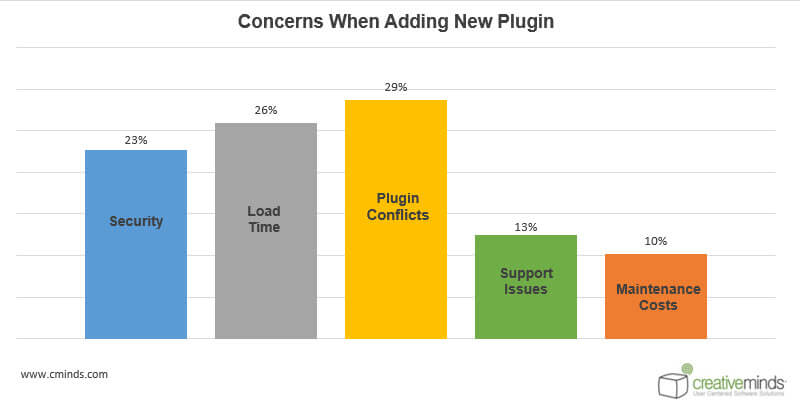
These are some big issues. Plugins can be a major source of vulnerabilities that malicious hackers use to gain access to your site. To address this concern, pick frequently updated plugins with well-written code. Also, make sure your general site security is up to speed with our in-depth guide.
Concerns about site load time and plugin conflicts can often be answered by seeing what others are saying about the plugins or by tools we describe below. Or you can create a sandbox (testing site) to test compatibility.
Unfortunately, it can be hard to tell exactly how your site will function with the new changes, so sometimes you have to bite the bullet and add the plugin to your site.
Users are less concerned with possible support issues or the cost of ongoing maintenance when adding a new plugin.
The cost of ongoing maintenance is worth examining before using a plugin so there are no surprises later on. Plugin maintenance costs can include renewing a plugin license, support, and upgrades.
For some plugins, these costs are included in the original purchase, but for others, they aren’t. Often, certain features are included for a limited time after the purchase. Also, if you’d rather hire a company to maintain your plugins, that’s another cost.
It’s better to be upfront and learn all the costs included before committing to a plugin. It’s easy to underestimate the true cost of WordPress maintenance. This article is geared toward those providing WordPress maintenance services, but it has some good information every user can benefit from knowing.
Plugin Evaluation Tools

In considering what plugin to use, it can be useful to take advantage of tools that allow you to evaluate plugins. These can help users make big decisions about what plugins are best for their site.
In response to the question of how users measure plugin support, only 5% WordPress users say they use plugin comparison tool to evaluate support behind a plugin. This may be because users are not aware of tools to influence their decision.
Comparison
The “Quality” indicator is nice because it is broken down into different components with separate scores. For instance, if you wanted to evaluate a plugin’s support, you could look at the support score.
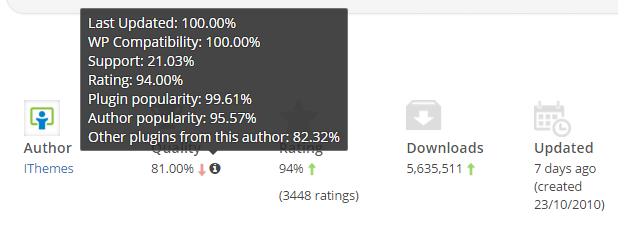
Quality score for Ithemes Security plugin
Of course, this can’t be viewed as a definitive answer, as it depends on your individual site’s needs, but it can definitely help the decision making process.
Testing
Duplicator allows you to make an exact clone of your site in order to test themes, plugins, etc. This can be a great way to see how a plugin works without risking the integrity of your site.
You can get an accurate view of whether a plugin is compatible with your current site.
Site Speed
Several survey responders mentioned they use the P3 plugin developed by GoDaddy.
This plugin tells what plugins are slowing your site down. It gives an in-depth report of the speeds for each plugin used, so you can see whether a plugin is slowing your site after you download it.
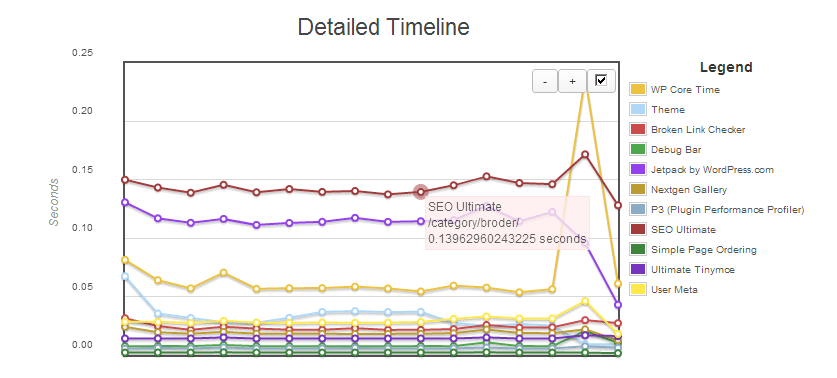
A graph output by the P3 plugin
It’s a handy tool for figuring out the exact reason for site speed issues.
Plugin Licenses
We also asked WordPress users about plugin licenses. Some plugins limit the number of installations and charge for extra installations. Others allow you to install the plugin on as many sites as you’d like. This really depends on the developer.
The majority of WordPress users will choose a plugin with a limited installation license, as long as it serves their need. 27% of users only use plugins with unlimited installations.
This shows users tend to value unlimited installations, unless they feel it is necessary to pick one with a limited installation license.
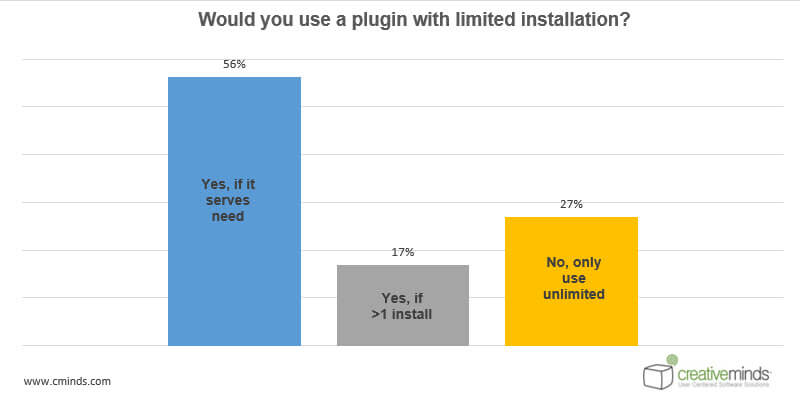
What about plugins with a General Public License (GPL)? Do users check for this?
First, what is GPL? GPL version 2 (or later) developed by the Free Software Foundation is the license WordPress software is released under. It basically ensures that WordPress continues to be open-source. People are able to share and alter plugins. Anyone that develops a plugin can distribute it for free or for a price.
The GPL also has a “copyleft” provision, meaning that if someone alters an existing plugin, they can’t sell it and make a profit off the first developer’s work. If you’re unfamiliar with GPL, this resource discusses the ins and outs.
Our research shows the majority of users (51%) don’t check to see if a plugin has a GPL. About a quarter of users only use GPL plugins.
This shows the jury is still out about GPL plugins. Some people support these plugins, while others don’t care or don’t check.
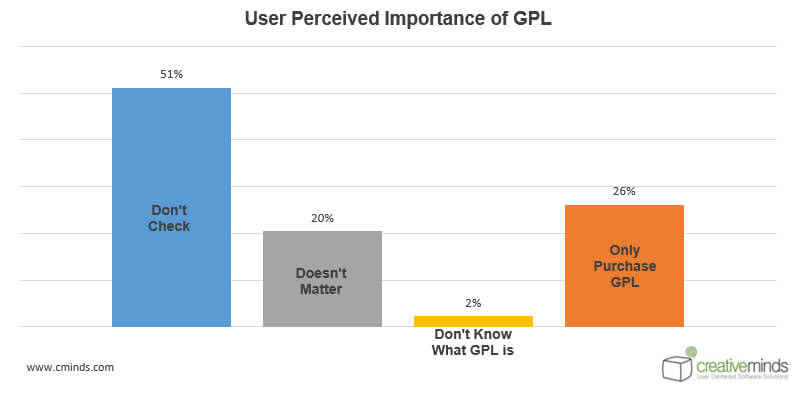
An Old-Fashioned Pros and Cons List

If there’s a lot at stake with your plugin decisions (i.e. you run a popular site with a lot of visitors, or rely on a site for your entire income), it may be useful to write down the pros and cons of going with a new plugin.
Now, this may seem a bit excessive, but if you realize what’s at stake is the integrity of your site and reputation, it doesn’t seem so excessive.
Summary
Plugin decisions are important. The results of this survey show WordPress users take many things into consideration when choosing a WordPress plugin.
Each user will have a slightly different approach to picking plugins, but our survey shows there are some commonalities. Here’s an overview of what we learned:
- Users pick both free and premium plugins
- They tend to pick premium over free for the unique features
- Most users are willing to pay over $60 for a good plugin
- Security, ease of use, and support are all important
- Frequent updates and the developer’s reputation help users decide between two plugins
- Users worry about security, site speed, and compatibility when adding a new plugin
Have comments or questions about the survey? Reach out to us!




